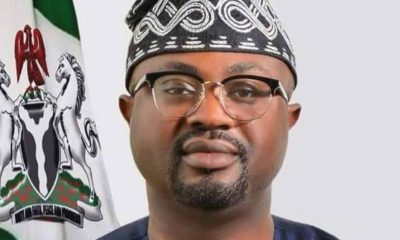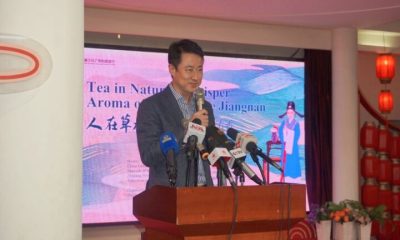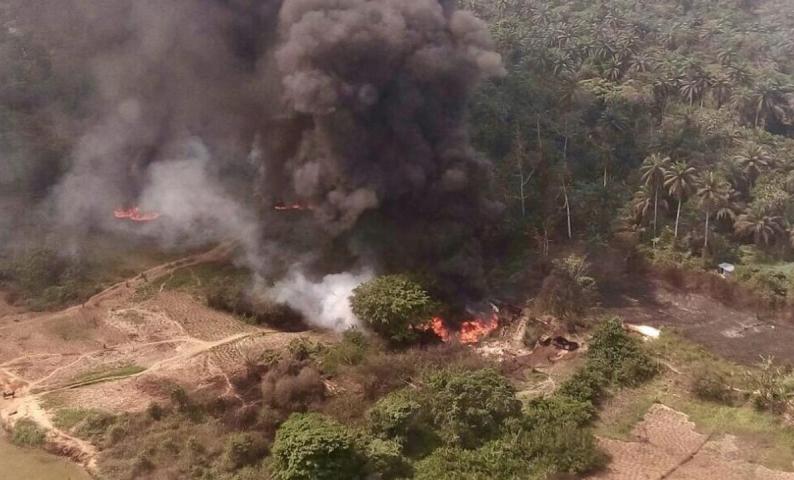EDITORIAL
Hardship: Time to Reverse Lopsided Reforms

That poverty-stricken Nigerians are dying needlessly daily as a result of hunger and depression is no longer news. No thanks to multidimensional poverty, poor mental health and lack of affordable health care ravaging the land.
There is galloping inflation, occasioned by haphazard policies of the Tinubu-led administration; particularly the abrupt removal of fuel subsidy.
To worsen matters, there is widespread and excruciating starvation and hardship which is gradually choking and snuffing life out of many Nigerians.The situation has deteriorated to an abysmal level that urban and rural poor can no longer afford high prices of foodstuffs and commodities in the market and this is a serious source of concern.
On the other hand, the rich are not finding it easy either, because of mounting requests for assistance from the down-trodden. Worst hit by the economic crisis are household consumables. To eat once a day in most homes today is a luxury.
All is not well in Nigeria. Yet, the political class enjoying jumbo pay and bogus government allowances have continued to urge the Nigerians to exercise patience, insisting there is “renewed hope”. Alas, what is in existence is hopelessness and hunger in the land.
According to the National Bureau of Statistics (NBS), in Sept., food inflation increased to 32.72 percent from 23.67 percent in the corresponding year, an unfortunate reality largely due to the sudden fuel subsidy removal by President Bola Tinubu. Instructively, Vice President Kashim Shettima admitted during the recent Nigerian Economic Summit in Abuja that some of the economic reforms of the present administration have been painful, though inevitable.
According to the Vice President, many other nations like Nigeria were experiencing significant economic problems over the past few years.
“Nigeria’s growth trajectory has been volatile, heavily dependent on oil revenue and unable to create enough jobs to keep pace with our rapidly growing population. As a nation, we must prioritize economic diversification.
“Considering this, the present administration, through the Renewal Hope Agenda has embarked on bold and courageous reforms designed to create an environment that fosters sustainable economic growth and shared prosperity, though painful at the moment. Our focus is on sectors that can offer inclusive and sustainable growth such as agriculture, manufacturing and the digital economy,” he explained.
While commending the Nigerian Economic Summit Group (NESG) for being in the forefront of helping the government by creating a platform for meaningful conversation on the economy, he said the opportunity has made it imperative to halt the catastrophe before it consumes the country.
Despite the fact that the recent figures from the NBS show that inflation fell to 33.40 percent in the month of June, the reality is that inflation is still driving up the prices of essential commodities like food and petrol, thereby exacerbating the hardship and hunger ravaging the urban and rural poor, as small increases in the cost of basic goods and foodstuffs impact negatively on low-income families.
Although records show that food inflation has slightly decreased to 39.53 percent from 40.87 percent, as a result of harvesting period, the slight reduction has not translated into lower prices in the market.
Nigerians are of the common view that the avoidable economic downturn in the country, owes much to the unprecedented devaluation of the naira – a direct consequence of high inflation – which has reduced low-income families to unimaginable levels of desperation and destitution; to the extent that those caught up in this web are now sacrificing essential needs like their children’s education and often times healthcare just to live from hand to mouth.
It is fair to state categorically that the removal of fuel subsidy has really brought about untold hardship to millions of Nigerians because fuel price hike has driven up the prices of goods and services throughout the country.
Despite the monumental corruption in the oil sector vis-a-vis the so-called subsidy regime, the greatest victims of subsidy removal are the masses. This is because fuel is the essential ingredient that drives and revolves round most activities in the country, ranging from transportation, small and medium scale enterprises, petty businesses, technology and tourism.
During the campaign to remove the subsidy, the issue that elicited a lot of concern was federal government’s inability to identify and penalize those benefiting from the fraud called fuel subsidy.
No matter the level of corruption in the oil industry, the Nigerian Midstream and Downstream Regulatory Authority (NMDPRA), the drivers of the reforms in the sector in collaboration with Nigerian National Petroleum Company Limited (NNPCL), should have been able to stop the payment of subsidies to the faceless importers of petroleum products and channel the resources into the provision of infrastructure and employment for the benefit of the people, rather than outright removal of the subsidy, a move which has dealt a major blow to the nation’s economy.
Halting the hardship in the country and reviving an economy which is contending with high fiscal deficits, low Gross Domestic Product (GDP) and high inflation are as complex and challenging as fighting corruption in a nation like Nigeria. But it can be achieved if the government becomes more strategic and intentional in its game plan to reverse the ugly trend.
If there is (political) will, there must be a way. The popular refrain among government officials is that Nigeria is not the only country passing through economic hardship. That is not far from the truth but mouthing such excuses without marshaling any action plan for sustainable economic growth could be suicidal.
The federal government has consistently appealed to Nigerians to tighten-up their belts and they have complied and are still complying. Surprisingly, top government officials are not practising what they are preaching, whereas more than a 100 million Nigerians living in extreme poverty are subjected to unbearable austerity measures.
A government that fails to encourage and promote transparency and accountability does not have the legal and moral justification to urge people to continue tightening-up their belts. There is an urgent and compelling need for the federal government to implement the much orchestrated fiscal discipline by reducing non-essential government spending and improving the effectiveness of public infrastructure, security and welfare of the citizenry.
Unless and until the government stops its unnecessary lip service of insisting that Nigeria is on the path to progress and urgently reduces its over reliance on oil exports and promote other critical sectors like agriculture, manufacturing and technology, the much needed economic revival would remain nothing but a dream.
Again, Small and Medium-sized Enterprises (SMEAs) must receive the support of government as this would foster entrepreneurship and innovation. But without power such expectations are impossible. Sadly, the crisis in the power sector is not going away. Instead, the growing challenge has overwhelmed the present administration just as those before it.
DAILY ASSET strongly believes that addressing inflation, the fallout of which is the untold hardship Nigerians are experiencing today, requires a frontal and comprehensive approach from the federal government rather than the lopsided reforms that encourage wasteful spending to the detriment of the masses.
For instance, government cannot overhaul and fix its moribund refineries which have gulped over $25 billion in the last 27 years but can unilaterally jack up prices of petroleum products, the way it did under subsidy removal.
Similarly government must not arbitrarily raise cost of electricity and other taxes without addressing epileptic power supply and other associated challenges.
There must be a complex balance of pragmatism and sustained commitment to promote, sustain and consolidate economic stability, growth and productivity.
EDITORIAL
Deploy Technology and Intelligence to Fight Insecurity

The growing insecurity in Nigeria – banditry, kidnappings, terrorism and other violent crimes, can rightly be described ‘a national calamity’ that requires the use of technology and intelligence to combat.Realising this, Plateau, a North Central state, grappling with worse security challenges, has announced its partnership with Biench UAS Limited to acquire military-grade drones for surveillance, intelligence gathering and rapid response by security agencies.
At the recent unveiling of Briech UAS-manufactured drones and missiles in Kuje, the Federal Capital Territory (FCT), Abuja, Governor Caleb Mutfwang, alongside the Chief of Defence Staff, General Christopher Musa, emphasized the critical role of technology in modern security operations. They noted that the partnership represents a fresh and innovative approach to tackling security threats in the State and the nation at large.Mutfwang, commended the Nigerian Armed Forces for their dedication to national security. He called on the Nigerian military to encourage local manufacturers in producing military-grade surveillance equipment tailored towards tackling the nation’s unique security challenges.He further highlighted the impact of the partnership, noting that the deployment of Briech UAS facilities in Plateau State has already enhanced the efficiency of security forces on the ground and expressed optimism that the collaboration would further strengthen security operations, ultimately restoring peace and enabling farmers to return safely to their fields.“The time is now to address these challenges that hinder national prosperity. One of my key aspirations for this year is to see Plateau State farmers return to their farms. The only way to achieve this is by providing them with adequate security coverage, both in the air and on the ground, ensuring their safety”, the governor stated.Nigeria’s Chief of Defence Staff, General Christopher Musa, lauded the innovation and initiative and assured that the Defence Headquarters would explore collaborative opportunities with the company to enhance national security efforts.“It is with great honour and appreciation that I witnessed the unveiling and live demonstration of the first set of locally manufactured attack drones by Briech UAS Limited. This marks a significant milestone in our nation’s journey toward self-reliance in defense technology and a major step in strengthening our security capabilities.”If properly utilized, the acquisition of cutting-edge surveillance technology and intelligence would significantly boost the capacity of security personnel to decisively combat criminal elements that are operating with different cells across the country.In fact, those technological advancements could contribute to securing victory over forces that have long destabilized the nation.Additionally, the cutting-edge technologies would provide critical intelligence to enable security forces to take swift and decisive actions against emerging threats.Moreover, in an era of increasingly complex security challenges, the adoption of advanced surveillance technology is pivotal to achieving optimal operational outcomes.The significance of the latest advancements in unmanned aerial vehicle (UAV) technology is a landmark achievement in the nation’s pursuit of enhanced security solutions hence the UAVs are equipped with advanced sensors and imaging technologies to enable them to detect and monitor activities that pose threats to national security.It is embarrassing, shameful and a monumental failure on the part of security agencies who for over two decades have been fighting insurgents, bandits, terrorists, arsonists and kidnappers without much success.In some instances, victims who fall prey to the criminals are brutally murdered while others are held in captivity under inhuman conditions for more than six months. Yet the criminals engage in telephone communication with security agencies and families of the victims without a clear cut way to track and attack them and rescue the innocent victims. This is an indictment on our security agencies.Recall when an American was kidnapped in a boarder town in Niger, a few years ago and trafficked across to Nigeria, the American seals, through the use of technology, tracked and promptly rescued one of their own in less than 24 hours.The Federal Government had acquired and equipped the Nigeria Air force with over 70 combat aircrafts in the last decade. Similarly, the combat equipment of the Nigeria Army, Nigeria Navy, Nigeria Police and other paramilitary forces have been enhanced, yet non-state actors are daily devising new criminal methods of perpetuating insecurity rather than the security agencies caging them.DAILY ASSET urges the Nigerian security agencies to immediately start deploying emerging technologies as well as strengthen intelligence gathering to make the country safe just as the security agencies of advanced nations deploy technology to check criminal activities of non-state actors.We commend the local assembly and manufacturing of military-grade surveillance drones and missiles as a step in the right direction that should be tailored to the nation’s unique security challenges.EDITORIAL
Gagging, Intimidating Critics and Opposition Unhelpful

Recently Nigerian musician and social critic, Eedris Abdulkareem stirred up the hornet’s nest when he dominated the headlines over the ban of his new release ‘Tell your Papa.’ In the music, he criticized President Bola Ahmed Tinubu’s government for throwing the nation into economic and social crises.
Abdulkareem, known for criticising bad governance, has for a period spanning over twenty years used his music to reflect on the state of the nation and point out faults and misdeeds of individuals or groups in government. So when “Tell Your Papa” hit the airwaves it was not surprising to the Nigerian public as they enjoyed and danced to it nostalgically. But the federal government was not comfortable with the message of the music. This development again put the musician at loggerheads with the-powers-that-be.Then came the hammer from the National Broadcasting Commission (NBC), swiftly banning ‘Tell your Papa’ from radio and television airwaves. The NBC cited powers it claimed to derive from Section 3:1.8 of the National Broadcasting Code, which empowers it to issue bans on abusive content.But pundits insist that the section cited by NBC no longer exists, with the only similar provision now found under Section 30:2.7.This section of the Code reads: ‘A programme or musical content classified as ‘Not To Be Broadcast’ (NTBB) shall not be broadcast.’ This appears, however, to be an arbitrary power inserted into the Code without any clear legal backing or justification.The song, according to a memo dated April 9 2025 and signed by Susan Obi, the coordinating director, broadcast monitoring, was deemed to be in violation of Section 3:1.8 of the Nigeria Broadcasting Code.Justifying the ban the NBC said it considered the song’s content to be ‘inappropriate’ and ‘objectionable,” saying it violated public decency standards on broadcast platforms. The commission advised stations to ‘exercise discretion’ and avoid airing the song to maintain ‘responsible broadcasting standards.’ According to the statement, “The National Broadcasting Commission has identified the song ‘Tell Your Papa’ by Abdulkareem, as content deemed inappropriate for broadcast due to its objectionable nature.Abdulkareem’s depiction of the current sufferings in the country may have infuriated the presidency about the fast-deteriorating living conditions in the country. The song highlights galloping inflation, rising crime, and worsening insecurity. ‘Tell your Papa Country hard.’ While accusing the president of implementing anti-people policies, with food prices, data costs, and school fees escalating, he urged him to look into the plight of Nigeria’s urban and rural poor. Thus, the government’s response banning the song from broadcast on radio and television stations nationwide was like killing the mosquito with a sledgehammer, thus further demonstrating the president’s increasing intolerance of criticism since assuming power.A cross-section of Nigerians view the ban as an affront to freedom of speech and a violation of the people’s rights to know. It is obvious that the song hit the federal government below the belt and perhaps what sparked the release of the now banned music could be the recent comments made by Seyi Tinubu publicly praising his father as the greatest Nigerian leader of all time.Abdulkareem did not take Seyi’s encomium on his father lightly. In his usual blunt style, he released the song in response, telling the younger Tinubu to “go and tell your papa” that Nigerians are not smiling at all. He has criticized several government policies past and present, particularly the controversial removal of fuel subsidies. Since the subsidy was removed, millions of Nigerians have felt the pang in their pockets – rising cost of transport fares, skyrocketing food prices and a general increase in the cost of living.Using the Cybercrimes Act, the government appears determined to silence critics, rather than addressing citizens’ genuine concerns about bad governance. Protests against government policies are frequently clamped down on. The planned peaceful protest by the Take It Back Movement in March was forcibly broken up in Port Harcourt, Abuja, and Lagos. Human rights advocates are increasingly alarmed by Nigeria’s descent into intolerance and authoritarianism under the Tinubu administrationAbdulkareem, a notable Nigerian rapper and former member of the hip-hop group – The Remedies. Known for his fearless voice and politically conscious lyrics, rose to national prominence in the early 2000s. After the group’s breakup in 2002.A true veteran of the Nigerian music scene, his journey encompasses several distinct chapters, each leaving a lasting mark.In 2022, the musician had a health challenge – kidney failure. Fortunately, he received a transplant from his wife in 2023. This experience shaped his recent music, with songs like ‘Thank You’ reflecting gratitude and ‘Ghetto Soldier’ highlighting resilience.DAILY ASSET posits that the government ought to have known that the era of silencing dissecting voices in the creative industry is over, due to several new media platforms to air contents all over the world whose servers are beyond the control of the Nigerian government.Moreover, the ban is a spark to further popularize Abdulkareem, his past and present music which might propel him a notch higher as a serial critic of bad governance in Nigeria through his musicAlso, Abdulkareem’s style of music reflects the frustration many Nigerians are facing as he questions how a president can be celebrated as great when the Nigerian people are suffering and starving. The ban is indeed a pointer to the increasing notoriety for intolerance and human rights violations by the nation’s political leadership.The current clampdown on opposition is a serious source of concern because the oxygen of constitutional democracy is freedom of expression and the right to ventilate one’s views. Gagging critics, intimidating opposition and suppressing freedom of expression, is definitely not the way to go.EDITORIAL
A Word of Caution to the Nigerian Senate

In concrete terms, the National Assembly is supposed to be the bastion of the nation’s democracy or what political pundits refer to as the engine of the constitutional system of government. In other words, without the National Assembly there is no democracy. With the return of democratic rule in 1999, Nigeria has had ten consecutive legislatures spanning a period of 26 years.
Nigeria operates a Bi-cameral legislature; made up of two Independent Chambers; the Senate and the House of Representatives.
Despite teething problems – ranging from the removal of various Senate Presidents and Speakers since the commencement of 4th Republic in 1999, the National Assembly could be described as a baby learning how to crawl, stand and walk in the 26 years of its existence.Of course, initially the excuse was that Nigeria was still a nascent democracy. The Nigerian Parliament right from inception had robust and historic developments which date back to the colonial and post-colonial independence but from whichever angle one looks at it, the 4th Republic has a huge legislative responsibility to perform its role as the foremost representatives of the Nigerian people by conscientiously performing its oversight functions and carrying out its core mandate.
Not only that, the lawmakers must not operate as if they are rubber stamps to the executive. By and large, the Senate as the upper chamber of Nigeria’s bicameral legislature is the nation’s legislature and has the power to make laws, as summarized in chapter one, section four of the 1999 Constitution of Nigeria as amended.
The Senate, referred to as the Red Chamber, is made up of 109 Senators representing three Senatorial Districts of each of the 36 states of the federation. Membership of the Chamber is based on equal representation. It is led by the Senate President and his Deputy (President of the Senate and Deputy President of the Senate) as well as principal officers namely Senate Leader and his Deputy, Minority Leader and his Deputy, Chief Whip and his Deputy as well as Minority Whip and his Deputy.
While the House of Representatives also known as the Green Chamber is made up of 360 Federal Representatives. Each member represents one Federal Constituency of Nigeria. The number of Constituencies per State varies since population strength is the criteria used to determine the number of each State’s Federal Constituencies.
The Green Chamber is led by the Speaker and assisted by the Deputy Speaker along with eight Principal Officers that include Majority Leader, Deputy Majority Leader, Minority Leader, Deputy Minority Leader, Chief Whip, Deputy Chief Whip, Minority Whip and Deputy Minority Whip.
The National Assembly is constitutionally vested with several functions. Prominent among them are lawmaking, representation, oversight and a host of others. Accordingly, the apex parliament operates the committee system. Both chambers of the nation’s highest law-making body appoint members into its Special and Standing Committees. The committees have the role of studying and researching Bills, Motions and other Legislative proposals referred to it and report its findings to the Whole Chamber.
Essentially, the major function of the Parliament, apart from its oversight functions, is to ensure that there are checks and balances within the executive and judiciary arms of government. Which is why the parliamentarian is expected to conduct himself or herself with the highest decorum, responsibility and integrity, but unfortunately the 10th Senate under the presidency Godswill Akpabio is shrouded in controversies, mudslinging, unnecessary bickering and wranglings an unfortunate development which has painted the red chamber in bad light and by extension the entire National Assembly.
Senator Natasha Akpoti-Uduaghan, who represents Kogi Central in the Senate would readily come to mind for explicit sexual harassment allegations against the Senate President, Godswill Akpabio.
Akpoti-Uduaghan before her suspension from the Senate told the world how Senator Akpobio allegedly made inappropriate and suggestive remarks and gestures towards her in the presence of other senators and her husband.
The Nigerian Senate, apparently not wanting to be distracted or bogged down by the tantrums, has since shrugged off the heat generated by Senator Akpoti-Uduaghan’s six months suspension from the Senate and her far- reaching accusations against Senator Akpabio, with a vote of confidence. But the crisis in the Senate persists, the latest being the move by some so called concerned Kogi citizens and women groups to recall Senator Akpoti-Uduaghan.
However, her suspension has raised legal debates within Nigeria’s political establishment. With past judicial rulings against prolonged suspensions, her case raises important questions about the limits of the Senate’s disciplinary powers, the protection of lawmakers’ rights, and the broader implications for democratic governance.
Apart from suspending Akpoti-Uduaghan for six months, the upper chamber also withdrew her security aides, locked her Senate office, suspended her salary and allowances, and banned her from entering the National Assembly premises. Critics questioned whether her punishment was merely a disciplinary action or a politically motivated attempt to silence her.
DAILY ASSET is of the opinion that the unending crisis in the Senate about sexual harassment and bribery allegations – following the declaration of state of emergency in Rivers state – are enough distractions to prevent the lawmakers from performing their duties, a setback which is not good for the nation’s fledgling democracy. It is high time the Senate took its mandate of truly representing the electorate more seriously.


















